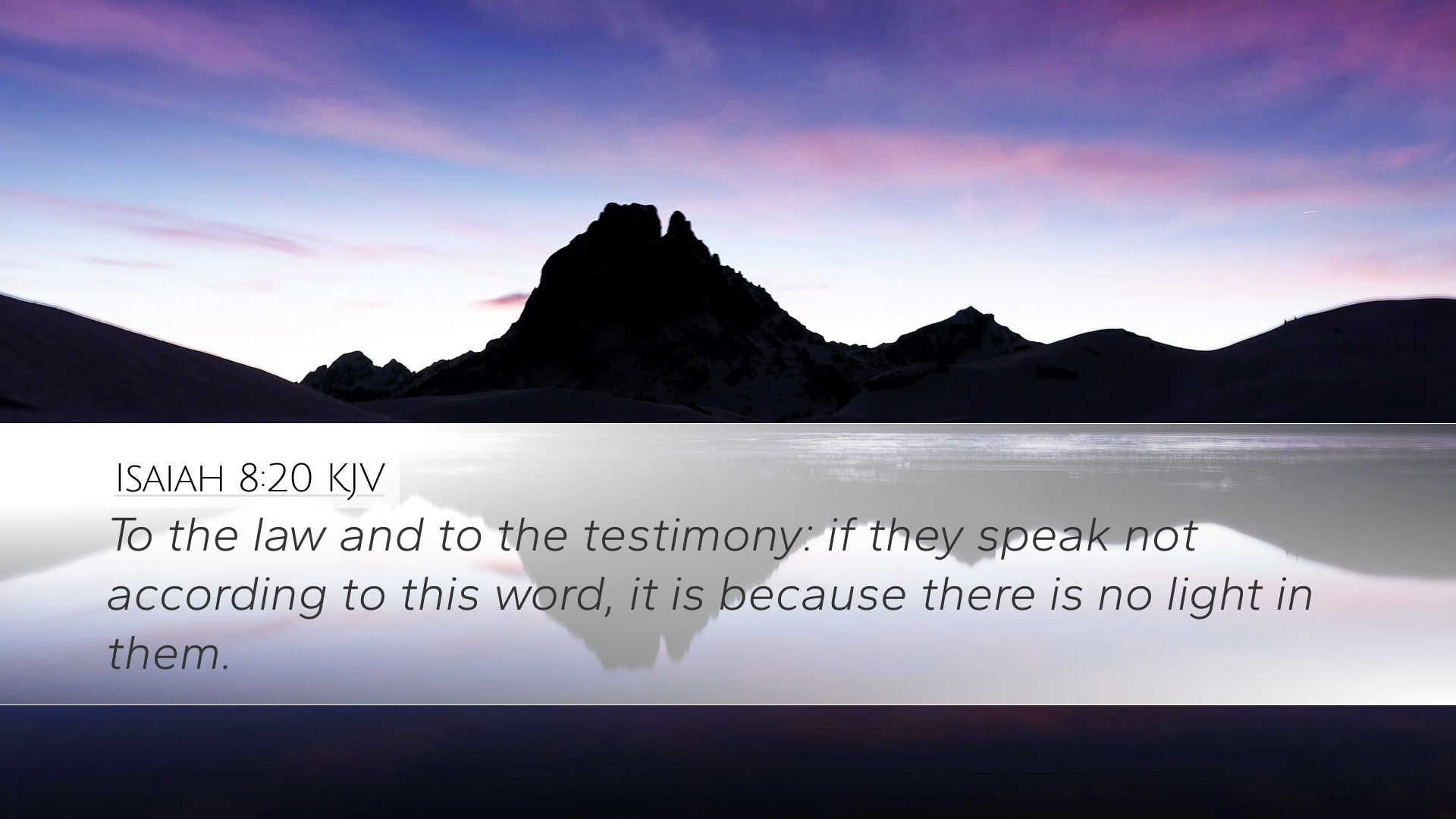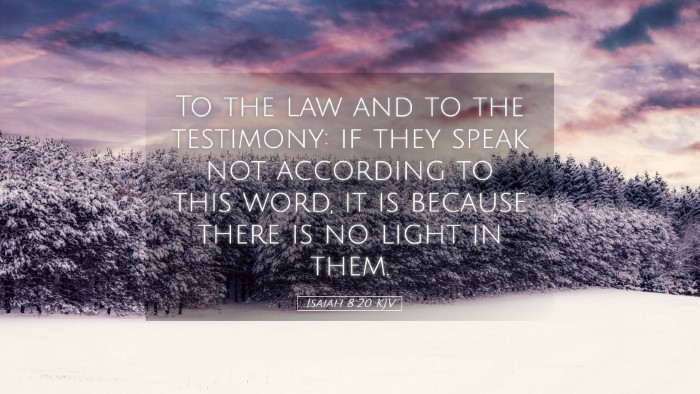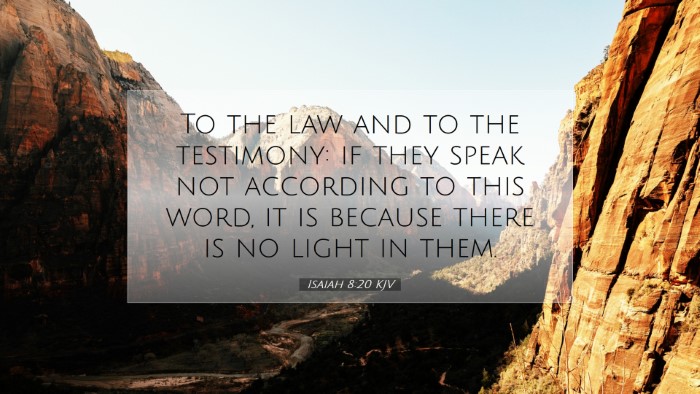Commentary on Isaiah 8:20
Verse Reference: Isaiah 8:20 - "To the law and to the testimony! If they do not speak according to this word, it is because there is no light in them."
Introduction
The verse from Isaiah 8:20 stands as a significant admonition regarding the authority of God's Word and the necessity of adhering to its teachings. This commentary compiles insights from esteemed public domain commentaries by Matthew Henry, Albert Barnes, and Adam Clarke. Such an exploration aims to illuminate the theological depth and practical implications of this verse for pastors, students, theologians, and scholars alike.
The Context of Isaiah 8
Isaiah 8 serves as a prophetic warning during a tumultuous time in Judah's history. The nation faced threats from foreign powers and internal spiritual decay. Isaiah emphasizes the importance of relying on God's guidance, particularly as the people were tempted to seek counsel from various sources, including necromancers and mediums.
Matthew Henry's Insights
Matthew Henry highlights that Isaiah’s message points fervently to the sanctity and supremacy of Scripture. He writes:
- To the Law: This phrase alludes to the Torah, which represents the moral and ceremonial laws given by God. It underscores the necessity of obedience to divine prescriptions.
- The Testimony: This refers to the prophetic words and the covenantal promises made by God. Henry stresses that these testimonies inform us of God’s character and His intended relationship with humanity.
- Criteria for True Guidance: He asserts that if someone does not adhere to these divine standards, it indicates a lack of divine illumination—"there is no light in them." The absence of truth in their words reflects their disconnection from God's revelation.
Albert Barnes' Commentary
Albert Barnes emphasizes the necessity of Scripture as the foundational standard for belief and practice. His reflections include:
- The Rejection of False Teachings: The societal plight of Judah prompted many to turn to genuine but misguided paths. Barnes echoes that any counsel contrary to the Scriptures indicates that the individual lacks divine insight.
- Light as a Metaphor: The term "light" symbolizes truth and divine revelation. Barnes notes that true prophets and teachers will be governed by the law and testimony and speak words illuminated by God’s truth.
- Call for Seriousness: Barnes asserts that this message is a serious warning against human pride and presumption, which lead to deviation from the divine path.
Adam Clarke’s Analysis
Adam Clarke provides a detailed exegesis of the text, elucidating various layers of meaning:
- Judicial Consequences: Clarke comments that Isaiah’s assertion serves as a judgment against false prophets—those who prioritize human wisdom over divine revelation will inevitably lead others astray.
- A Litmus Test of Truth: He contends that any spiritual guidance ought to be tested against Scripture. If such guidance deviates from "the law" and "the testimony," believers are called to reject it outright.
- Spiritual Intricacies: Clarke notes the rich spiritual implications behind this disclaimer, emphasizing that genuine spiritual leadership must always point back to the Scriptures as the ultimate authority.
Theological Implications
This verse brings forth several theological reflections:
- The Authority of Scripture: The law and testimony are not mere suggestions; they are authoritative. All teachings and doctrines must align with the designated parameters set by divine revelation.
- Illumination by the Spirit: The phrase "no light in them" implies a deeper spiritual reality—true understanding and knowledge come only from the Holy Spirit's guidance. Without this, attempts at interpretation can lead to darkness.
- Criteria for Discerning Truth: This verse provides a clear framework for evaluating doctrines, teachings, and spiritual experiences, guiding believers towards sound theology.
Practical Applications
As we consider Isaiah 8:20, it calls for several practical responses:
- Commitment to the Word: Pastors and leaders must prioritize Scriptural engagement in their ministries. Regular teaching and preaching of the Word safeguard against error.
- Discernment in Spiritual Matters: Believers are urged to develop a keen sense of discernment, assessing teachings against the backdrop of Scripture, recognizing that cultural influences can lead to doctrinal compromise.
- Encouragement of Theological Literacy: There is a need for strengthening the church's theological education, empowering believers to understand and interpret the Scriptures responsibly.
Conclusion
Isaiah 8:20 serves as a timeless exhortation about the importance of grounding faith and practice in the Word of God. The insights drawn from the commentaries of Matthew Henry, Albert Barnes, and Adam Clarke weave together a rich tapestry of understanding that encourages both reverence for Scripture and a diligent pursuit of truth. For pastors, students, theologians, and scholars, this verse not only illustrates the significance of divine guidance but also challenges them to be vigilant in speaking and adhering to the truth of God's Word.


